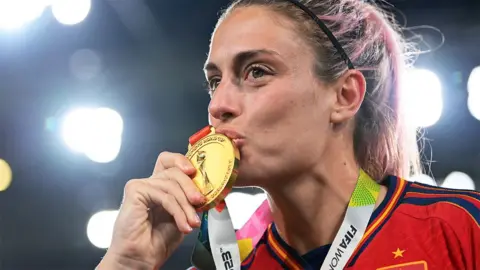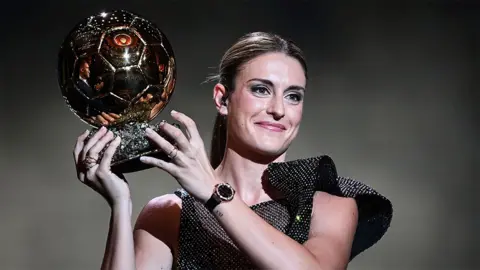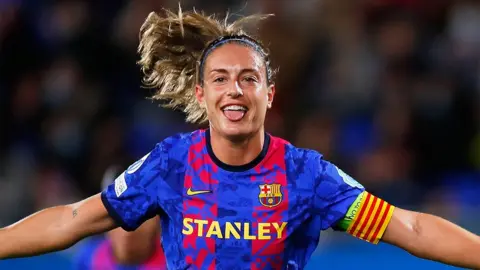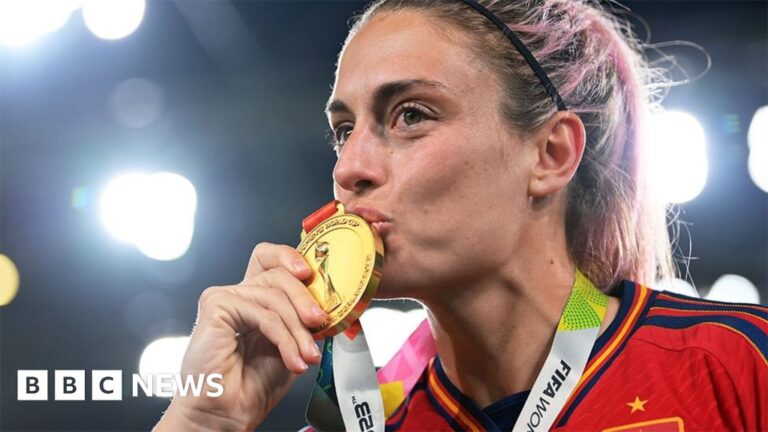 Getty Images
Getty ImagesSpanish football is currently on top of the world.
Last year, her women’s team won the World Cup in a hard-fought final against England.
But, as Alexia Putellas is quick to point out when speaking to BBC Newsbeat, they are not the only ones taking home silverware.
The country’s under-17 and under-20 women’s teams are also reigning world champions.
Oh, and the men’s team also won the Euro a few weeks ago.
Putellas, a two-time winner of the prestigious Ballon d’Or, is now aiming for another prize.
The FC Barcelona captain will soon kick off Spain’s campaign for Olympic gold.
Male competitors over the age of 24 cannot represent their country at the extravagant sporting event, but there is no age limit for women.
Putellas, speaking after training for the Paris Games, admits she is “so tired” after the post-season session.
And while she is keen to cap a remarkable run of success in Spanish football, she says the Olympics “are so different” to other tournaments.
“It’s like magic,” Putellas says.
“There will be the best athletes from every sport in the world, so it’s incredible to be a part of it.”
But you can never have too many medals.
“We don’t just want to go, we want to compete and, of course, win,” Putellas says.
The midfielder has some experience of winning: she helped her club, Barcelona, win eight league titles and three Champions Leagues.
She was also part of Spain’s World Cup-winning team and is the country’s top scorer and most capped player.
“You have to work every day, train,” she says.
“If you love it, you work hard. And then I think good things will happen.”
 Getty Images
Getty ImagesMuch of her success, she says, is also due to the resources her club, Barcelona, has put into its women’s team.
“I feel privileged. Because I go to the club every morning and I have everything to work hard for,” she says.
“All the facilities, the best coach, the best staff.
“And for me, I feel bad, because I know that’s not the reality for all players.”
In England, concerns have been raised about the resources being devoted to women’s football.
Some teams have facing financial difficultieseven if incomes increase more widely.
“I hope everyone takes women’s football as seriously as Barcelona,” Putellas says.
“Everyone asks you for a photo or encourages you, it’s so magical, this environment.”
Putellas has we have already talked about institutions “Courage and leadership” are needed to prevent women from experiencing “disrespect or abuse.”
Her teammate Jenni Hermoso was kissed without her consent by former Spanish football president Luis Rubiales.
He is now accused of sexual assault and coercion, which he denies.
Putellas believes authorities can do more to support women’s football.
“We are working and I think it is going better than before,” she said.
“But it’s never enough.”
She says she feels a responsibility to use her platform to advance the cause of women in sport.
“As a person, I am calm. I like to be with my family and friends,” she says.
“But I also have a lot of interest in sport, not just to be a footballer, for example, but also to be an ambassador and a mentor.”
 Getty Images
Getty ImagesDuring her career, Putellas has experienced setbacks and injuries, but she has been able to bounce back.
She advises other young players not to lose hope in difficult times.
“I feel like sometimes the player has to do things that are out of our control,” she said.
“Sometimes our power has to be on the ground.
“But maybe you’ll get another opportunity at another club. Try to work hard, be positive.”
Ultimately, for Putellas, it is always the love of the game that prevails.
“Why is football so special? Because I think it’s the best thing I do, I’ve been playing football since I was six years old,” she says.
“I like the way you connect with your teammates on the field… if you connect with a teammate and pass, pass, pass.
“And the moment you score, it’s a feeling that produces happiness,” she says.




